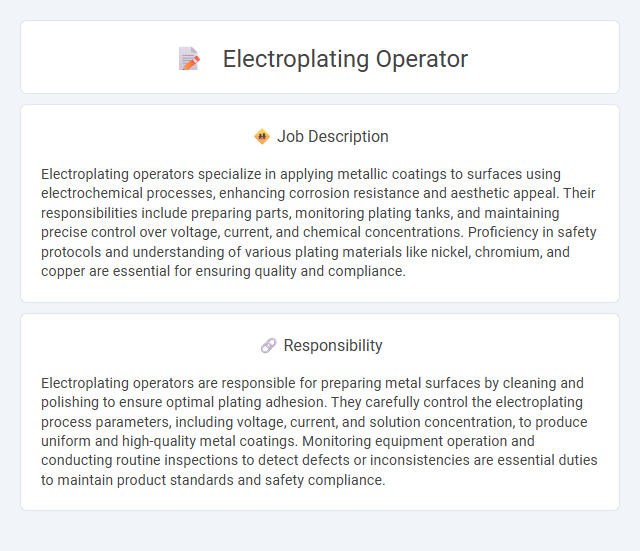
Electroplating operators specialize in applying metallic coatings to surfaces using electrochemical processes, enhancing corrosion resistance and aesthetic appeal. Their responsibilities include preparing parts, monitoring plating tanks, and maintaining precise control over voltage, current, and chemical concentrations. Proficiency in safety protocols and understanding of various plating materials like nickel, chromium, and copper are essential for ensuring quality and compliance.
Individuals with good manual dexterity and attention to detail are likely to be suitable for electroplating operator positions, as the job involves handling chemicals and precise equipment. Candidates who can tolerate standing for extended periods and work safely in environments with potentially hazardous materials may find this role fitting. Those with respiratory or skin sensitivities might face challenges, reducing the probability of long-term suitability.
Qualification
Electroplating operators must have a high school diploma or equivalent, with specialized training in chemical handling and metal finishing techniques. Proficiency in operating plating equipment, knowledge of safety protocols, and understanding of corrosion and adhesion properties are essential qualifications. Experience with quality control processes and the ability to interpret technical specifications enhance job performance in electroplating operations.
Responsibility
Electroplating operators are responsible for preparing metal surfaces by cleaning and polishing to ensure optimal plating adhesion. They carefully control the electroplating process parameters, including voltage, current, and solution concentration, to produce uniform and high-quality metal coatings. Monitoring equipment operation and conducting routine inspections to detect defects or inconsistencies are essential duties to maintain product standards and safety compliance.
Benefit
Electroplating operators likely benefit from hands-on experience in advanced surface finishing techniques, which can enhance their technical skills and career prospects. The role may provide opportunities to work in controlled environments that prioritize safety and precision, potentially leading to stable employment in manufacturing sectors. Workers in this position might also receive training on the latest electroplating technologies, increasing their value in the job market.
Challenge
Electroplating operator roles likely involve precise control over chemical processes to ensure high-quality metal coatings, which can be challenging due to the need for consistent solution chemistry and temperature management. Operators probably face difficulties maintaining safety standards when handling hazardous materials and ensuring equipment operates correctly to prevent defects. Mastery of problem-solving skills is essential as unexpected fluctuations in plating outcomes may require swift adjustments and technical troubleshooting.
Career Advancement
Electroplating operators gain expertise in metal finishing processes such as coating and corrosion resistance, which can lead to advancement into supervisory or quality control roles. Mastery of chemical bath management and equipment maintenance enhances career opportunities in manufacturing and industrial sectors. Specialized certifications in electroplating techniques further boost prospects for promotion and higher salaries.
 kuljobs.com
kuljobs.com